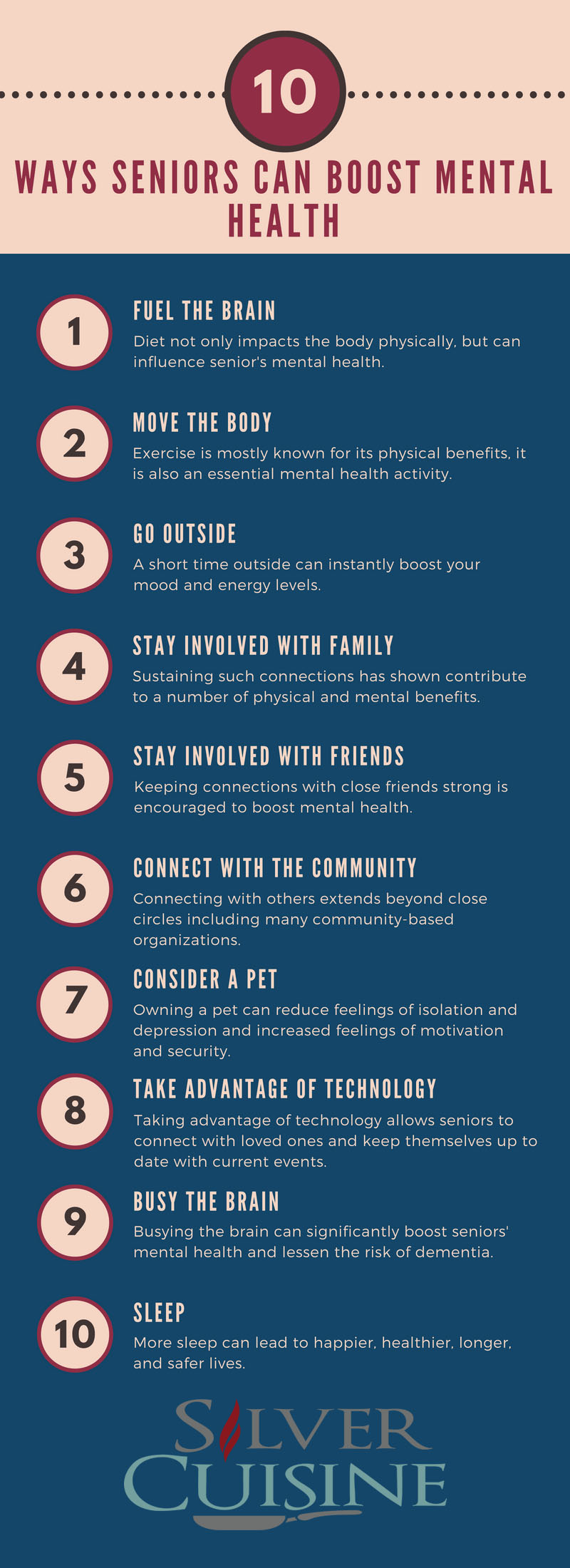According to the National Council on Aging, one in four older adults experiences some sort of mental disorder such as depression, anxiety, and dementia. And strikingly, this number is expected to double to 15 million by 2030!
Nonetheless, incorporating these simple ways to boost senior’s mental health and well-being can help deter the rising statistics and improve quality of life amidst the elderly population.
10 Simple Ways to Boost Seniors’ Mental Health
1. Fuel the Brain
Diet not only impacts the body physically, but can influence senior’s mental health for better or for worse…
Embracing a heart-healthy, balanced diet rich in whole grains, fruits and veggies, lean proteins, and healthy fats has proven promote brain health, even with potential to mitigate against depression and reduce dementia risk.
But eating a balanced diet does not have to be difficult… One of the best things to make life easier (and healthier) for the elderly is by utilizing Silver Cuisine!
Created for seniors in mind, Silver Cuisine is an a la cart meal delivery service providing well-balanced meals straight to doorsteps. (No grocery shopping, meal prepping, kitchen cleanup required – just nutritious and delicious meals to quickly heat up and enjoy!)
2. Move the Body
Whereas exercise is mostly known for its physical benefits, it is also an essential mental health activity. Exercise boosts mood by increasing endorphins and other feel-good chemicals in the brain and reduces stress hormones, proving to be a remedy for managing both depression and anxiety!
Aim for 30 to 60 minutes of physical activity most days of the week and incorporate various forms of movement, including cardio, resistance training, balance exercises or try this Summer Workout Challenge.
Want to get a little more social? Try group exercise as a fun way to get 30 minutes or more of physical activity per day. Plus, group exercise also comes with a number of other benefits as well!
But the most importance is not necessarily on the type of activity itself, just that you are moving the body!
3. Go Outside
Even if just for 20 minutes, go outside! A short bout of the great outdoors can instantly boost mood and energy levels.
Getting outside also supplies vitamin D, with a deficiency of the “sunshine” vitamin being been linked to higher rates of depression and cognitive impairment. And with seniors more susceptible vitamin D deficiency, getting outside more often can deter such risks.
4. Stay Involved with Family
Keep family ties strong by staying involved with loved ones, as sustaining such connections has shown shown contribute to a number of physical and mental benefits.
Have fun exploring at the nature center with siblings, passing along a favorite recipe to children, and gardening with grandchildren.
5. And with Friends
Along with staying actively involved with family members, remain connected with peers.
Invite friends to get hair or nails done, see a movie, take a shopping trip, or over for dinner on a regular occasion.

6. Connect with the Community
Connecting with others extends beyond close circles and there are numerous community-based organizations seniors can take advantage of.
Exploring adult day care programs, local civic centers, volunteer work, and faith-based groups are valuable socialization opportunities.
7. Consider A Pet
But socializing is and can be much more than human interaction… The benefits of elderly owning a pet are quite impressive and include reduced feelings of isolation and depression and increased feelings of motivation and security.
And not to mention, the benefits are not just one-sided. Think about it: Seniors who adopt a pet are providing their new furry companion with a new shot of a loving life!
8. Take Advantage of Technology
Though the senior population may have not grown up with the internet, the Pew Research Center reports internet use among those aged 65 years or older grew a whopping 150 percent between 2009 and 2011!
Taking advantage of technology allows seniors to connect with loved ones, explore entertainment, and research and learn new things, especially if they cannot regularly leave home.
9. Busy the Brain
Busying the brain can significantly boost seniors’ mental health and lessen the risk of dementia by sharpening memory, speeding up information processing, and improving reasoning and cognition.
Partake in at least 30 minutes of mind-stimulating activities daily, including piecing together puzzles, reading a book, learning how to play an instrument, playing board and card games, working on crossword puzzles, creating crafts, cooking in the kitchen, and organizing the closet.
Playing games with others can also busy the brain and simultaneously encourage socialization!
10. Sleep
Sleep plays an integral part of mental health and according to the American Psychology Association, more sleep can lead to happier, healthier, longer, and safer lives.
Alas, seniors are at increase risk of sleep disturbances and insomnia, which increases the risk of depression and other chronic diseases. So if struggling to achieve the recommended seven to nine hours of sleep each night, these 10 ideas to help cure insomnia can foster a better night’s rest.






